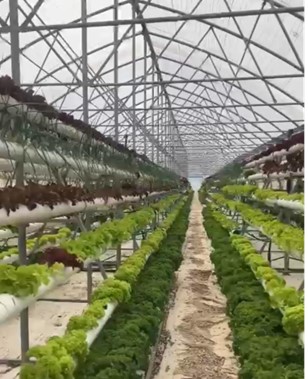
To fulfill the demands of an expanding population and address issues like urbanization and climate change, agriculture has undergone tremendous transformation. The practice of growing crops in stacked layers in controlled surroundings, such as indoor facilities or high-rise buildings, is known as vertical farming, and it is becoming more popular both internationally and in Lebanon. Beyond merely producing food, vertical farming supports sustainable development and provides answers to issues like urban food insecurity and environmental degradation.
Like many other nations, Lebanon struggles with environmental deterioration brought on by traditional agricultural methods. Traditional agriculture contributes to several environmental concerns, such as deforestation, soil erosion, water shortages, and chemical pollution. Due to the great reduction in the environmental impact of food production, vertical farming presents a sustainable option.
Vertical farming makes effective use of vertical space as opposed to traditional farming, which requires large amounts of ground, enabling high-density food production in small urban locations. This creative strategy lessens the loss of biodiversity and protects important natural ecosystems by using less land. Furthermore, vertical farming addresses the problem of water scarcity—a serious problem in Lebanon where water resources are scarce and under rising stress—by utilizing cutting-edge hydroponic or aeroponic systems that use a great deal less water than conventional agriculture.
Additionally, by doing away with the need for toxic pesticides and herbicides, vertical farming lowers chemical pollution and protects the health of ecosystems. Vertical farms may lessen their carbon impact even further by using renewable energy sources like solar electricity, supporting Lebanon's efforts to tackle climate change.
Due to increased urbanization, unstable economies, and geopolitical unrest, food insecurity is becoming a bigger problem in Lebanon's major cities. Urban populations are increasingly concerned about food access and cost due to factors such as uneven resource distribution, restricted access to agricultural land, and reliance on food imports. By bringing food production closer to urban customers and decentralizing it, vertical farming offers a convincing answer to these urgent problems.
Lebanon can improve food security by creating vertical farms inside or close to urban areas, which will guarantee a steady supply of food that is supplied locally. Because vertical farms are closer to their customers, urban people can afford and have easier access to fresh produce since long-distance food distribution requires higher transportation and carbon emission expenses. Furthermore, the capacity of vertical farms to produce year-round guarantees a consistent flow of nutrient-dense crops, reducing the effect of external disturbances and seasonal variations on food availability.
In conclusion, among the many difficulties confronting Lebanon's urban terrain, vertical farming offers promise. Vertical farming provides a comprehensive response to urban food insecurity, environmental deterioration, and economic stagnation by leveraging technology, innovation, and sustainability. Vertical farming may lead to a greener, healthier, and more lucrative future for everyone in Lebanon as the country works to create a more resilient and egalitarian society.